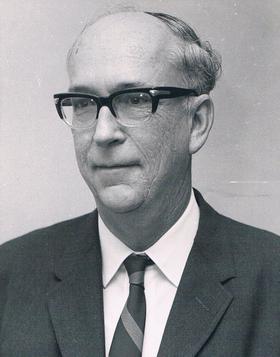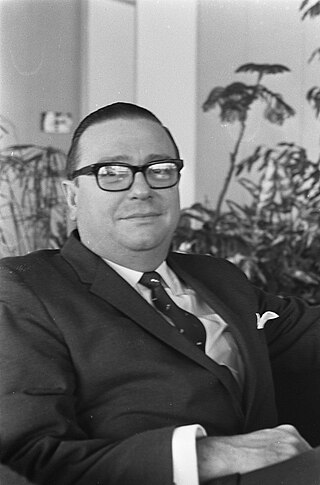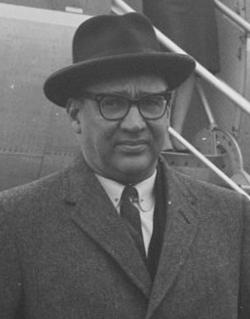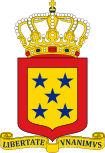
The Netherlands Antilles, also known as the Dutch Antilles, was a constituent Caribbean country of the Kingdom of the Netherlands consisting of the islands of Saba, Sint Eustatius, and Sint Maarten in the Lesser Antilles, and Aruba, Curaçao, and Bonaire in the Leeward Antilles. The country came into being in 1954 as the autonomous successor of the Dutch colony of Curaçao and Dependencies, and it was dissolved in 2010, when like Aruba in 1986, Sint Maarten and Curaçao gained status of constituent countries within the Kingdom of the Netherlands, and Saba, Sint Eustatius, and Bonaire gained status of special municipality of Netherlands as the Caribbean Netherlands. The neighboring Dutch colony of Surinam in continental South America, did not become part of the Netherlands Antilles but became a separate autonomous country in 1954. All the territories that belonged to the Netherlands Antilles remain part of the kingdom today, although the legal status of each differs. As a group they are still commonly called the Dutch Caribbean, regardless of their legal status. People from this former territory continue to be called Antilleans in the Netherlands.

Gilberto François "Betico" Croes was an Aruban political activist who was a proponent for Aruba's separation from the Netherlands Antilles. This eventually occurred in 1986, but following a car accident on 31 December 1985, Croes lapsed into a coma and never became conscious to see his accomplishment. He is best remembered as "Libertador" (liberator) and as the father of the Aruban people.

The Kingdom of the Netherlands, commonly known simply as the Netherlands, is a sovereign state consisting of a collection of constituent territories united under the monarch of the Netherlands, who functions as head of state. The realm is not a federation; it is a unitary monarchy with its largest subdivision, the eponymous Netherlands, predominantly located in Northwestern Europe and with several smaller island territories located in the Caribbean.

The Prime Minister of Curaçao is the head of government of Curaçao. The post was created after the Netherlands Antilles had been dissolved on 10 October 2010 and Curaçao became a country within the Kingdom of the Netherlands. The Prime Minister, together with his Council of Ministers and the Governor of Curaçao form the executive branch of the government of Curaçao.

The Emblem of Curaçao is a yet to be adopted national symbol of Curaçao. The design will be based on a concept by Andresetti Monart featuring the Queen Emma Bridge, a cactus, a hummingbird and a traditional fishing boat, which was chosen through a design competition held in 2022. The emblem is set to replace the coat of arms of Curaçao, which has been in use since 24 July 1964.

Dominico Felipe "Don" Martina was a Curaçaoan politician. He served two terms as prime minister of the Netherlands Antilles. His first term lasted from November 1979 to October 1984 and his second term from January 1986 to July 1988.
Lucina Elena da Costa Gomez-Matheeuws was a Dutch Antillean politician for the National People's Party (PNP). She served as the ad interim Prime Minister of the Netherlands Antilles, an office her husband Moises Frumencio da Costa Gomez previously held, briefly in 1977. She was also the first female to hold the office. Prior to this, she was the Minister of Health and Environment, Welfare, Youth, Sports, Culture and Recreation (1970–1977).
Pedro José Atacho is a Curaçaoan politician. He was a member of the Party for the Restructured Antilles. During his political career he was Minister of Justice of the Netherlands Antilles from 1994 to 1998. He served in the Estates of the Netherlands Antilles, including a period as Speaker between 2007 and 2010. After the dissolution of the Netherlands Antilles in 2010 Atacho became a member of the Estates of Curaçao.

The Third Jonckheer cabinet was the 3rd cabinet of the Netherlands Antilles.

The Sprockel cabinet was the 5th cabinet of the Netherlands Antilles.

The Isa-Beaujon cabinet was the 7th cabinet of the Netherlands Antilles.

The Evertsz cabinet was the 8th cabinet of the Netherlands Antilles.

The Petronia cabinet was the 6th cabinet of the Netherlands Antilles.

Ramez Jorge (Ronchi) Isa was a politician of the Netherlands Antilles of Lebanese descent. Isa served as Prime Minister of the Netherlands Antilles from February 1971 until April 1971, and from November 1972 until December 1973.

Otto Rudolf Anthony Beaujon was a civil servant and politician of the Netherlands Antilles. Beaujon served as Speaker of the Estates of the Netherlands Antilles between 1966 and 1968, and Prime Minister of the Netherlands Antilles from 1 June 1971 until 15 November 1972.

Efraïn Jonckheer was a businessman and politician of the Netherlands Antilles. Jonckheer served as Prime Minister of the Netherlands Antilles from 8 November 1954 until 14 February 1968. He served as Minister Plenipotentiary of the Netherlands Antilles from 1968 until 1971, Ambassador of the Netherlands to Venezuela from 1971 until 1976, and to Costa Rica from 1976 until 1982. As of 2022, Jonckheer was the longest serving Prime Minister in the history of the Kingdom of the Netherlands.

Ernesto Otilio "Netto" Petronia was an Curaçao-born Aruban businessman and politician. He served many times as a minister with multiple portfolios, and was Prime Minister of the Netherlands Antilles from 1969 until 1971.

Sylvius Gerard Marie "Boy" Rozendal was an Curaçao politician and journalist. He served as Prime Minister of the Netherlands Antilles from 1971 until 1975, Minister of Finance and Deputy Prime Minister from 1969 until 1971, and Minister Plenipotentiary of the Netherlands Antilles from 1971 until 1975.

Ciro Domenico Kroon was an Curaçao politician and businessman. He served as Minister of Social and Economic Affairs from 1957 until 1968, and Prime Minister of the Netherlands Antilles from 1968 until 1969. The 1969 Curaçao uprising caused the collapse of his government.


































